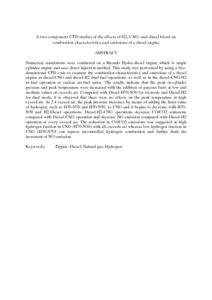Citation
Alrazen, Hayder A. and Abu Talib, Abd. Rahim and Ahmad, Kamarul Arifin
(2015)
A two-component CFD studies of the effects of H2, CNG, and diesel blend on combustion characteristics and emissions of a diesel engine.
International Journal of Hydrogen Energy, 41 (24).
pp. 10483-10495.
ISSN 0360-3199; ESSN: 1879-3487
Abstract
Numerical simulations were conducted on a Ricardo Hydra diesel engine which is single cylinder engine and uses direct injection method. This study was performed by using a two-dimensional CFD code to examine the combustion characteristics and emissions of a diesel engine in diesel-CNG and diesel-H2 dual-fuel operations, as well as in the diesel-CNG-H2 tri-fuel operation at various air-fuel ratios. The results indicate that the peak in-cylinder pressure and peak temperature were increased with the addition of gaseous fuels at low and medium values of exceeds air. Compared with Diesel-H70-N30 for tri-mode and Diesel-H2 for dual mode, it is observed that there were no effects on the peak temperature at high exceed air. At 2.4 exceed air, the peak pressure increases by means of adding the limit value of hydrogen, such as H30-N70 and H50-N50, to CNG and it begins to decrease with H70-N30 and H2-Diesel operations. Diesel-H2-CNG operations decrease CO/CO2 emissions compared with Diesel-CNG operation and decrease NO emission compared with Diesel-H2 operation at every exceed air. The reduction in CO/CO2 emissions was suggested at high hydrogen fraction in CNG (H70-N30) with all exceeds air whereas low hydrogen fraction in CNG (H30-N70) can repress uncontrolled hydrogen combustion and further limit the increment of NO emission.
Download File
![[img]](http://psasir.upm.edu.my/43626/1.hassmallThumbnailVersion/A%20two-component%20CFD%20studies%20of%20the%20effects%20of%20H2%2C%20CNG%2C%20and%20diesel%20blend%20on%20combustion%20characteristics%20and%20emissions%20of%20a%20diesel%20engine.pdf)  Preview |
|
PDF (Abstract)
A two-component CFD studies of the effects of H2, CNG, and diesel blend on combustion characteristics and emissions of a diesel engine.pdf
Download (5kB)
| Preview
|
|
Additional Metadata
Actions (login required)
 |
View Item |

